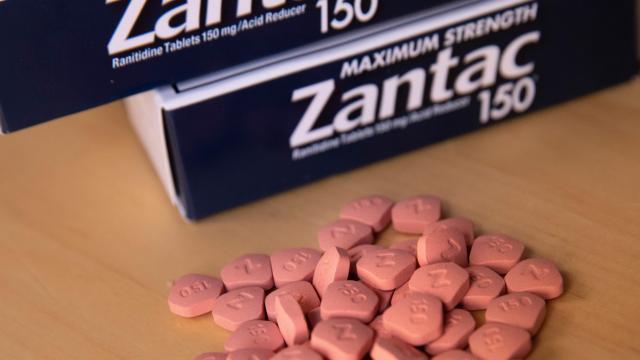The U.S. Food and Drug Administration is taking a drastic step over a common drug used to treat allergies and acid reflux, following an investigation that confirmed the persistent presence of a likely carcinogen in products containing it. On Wednesday, the agency announced that it’s requesting all manufacturers of ranitidine to immediately pull any remaining products off the market; it’s also telling any users of ranitidine to throw out their bottles and switch to other medications.
Last June, the independent testing lab company Valisure flagged a potential concern to the FDA. Its tests had found a chemical known as N-nitrosodimethylamine, or NDMA, in products containing ranitidine, which include the popular brand name heartburn drug Zantac. They theorised that ranitidine itself was breaking down into NDMA under certain conditions, including high heat.
NDMA is used to induce cancer in lab animals and is considered a probable human carcinogen. A year earlier, it was found in products containing the drug valsartan, which prompted a series of widespread recalls. In that case, though, the NDMA was traced back to contamination at manufacturing facilities.
By September, the FDA announced its own investigation of the link between ranitidine products and NDMA, though the agency didn’t initially jump on with Valisure’s theory. NDMA is found in trace amounts practically everywhere in the environment, and it can be accidentally produced in all sorts of ways. Initially, the FDA stated the NDMA it had found in products “barely exceeded” the trace levels sometimes found in food and didn’t seem to pose any cancer risk.
Nevertheless, the agency began complied, and by March 2020, many products with ranitidine were temporarily taken off the market.
The FDA’s investigation has seemingly now agreed with Valisure’s initial conclusions. The agency determined that levels of NDMA can build up in ranitidine products over time, especially when these products are stored at higher than room temperature. And because of the potential that people can be exposed to much higher amounts of NDMA than the initial FDA tests showed, the agency has decided to effectively shelve any and all ranitidine products in the U.S. for the foreseeable future.
“The FDA is sending letters to all manufacturers of ranitidine requesting they withdraw their products from the market. The FDA is also advising consumers taking OTC ranitidine to stop taking any tablets or liquid they currently have, dispose of them properly and not buy more,” the agency said in its announcement Wednesday.
Thankfully, ranitidine is only one of many similar antihistamines and antacids available to people, so switching medications shouldn’t be too much of a worry. According to the FDA, products containing famotidine (Pepcid), cimetidine (Tagamet), esomeprazole (Nexium), lansoprazole (Prevacid) or omeprazole (Prilosec) do not appear to contain NDMA. Those with a prescription ranitidine product should talk with doctors about which drug is the best replacement.
